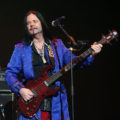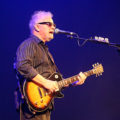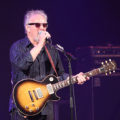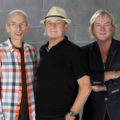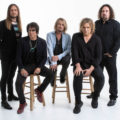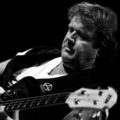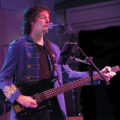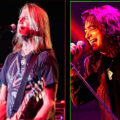In the “Heat Of The Moment” as Asia featuring John Payne eyes Aurora’s RiverEdge Park
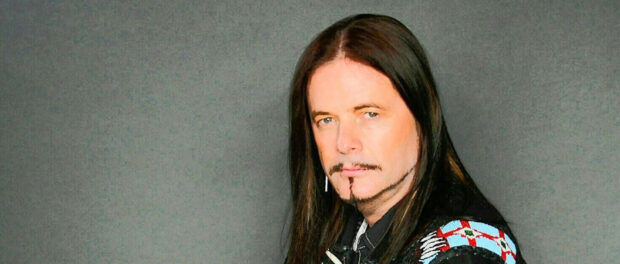 Photos provided by DVG Artists
Photos provided by DVG Artists
Stepping into the shoes of former King Crimson/U.K. vocalist John Wetton was a daunting task to say the least, but John Payne rose to the occasion for no less than fourteen years and eight studio albums carrying on as front man for “Heat Of The Moment” hitmakers Asia.
Though the original supergroup, also comprised of guitarist Steve Howe (Yes), keyboardist Geoff Downes (The Buggles, Yes) and drummer Carl Palmer (Emerson, Lake & Palmer), wound up reuniting prior to the passing of Wetton and has a retooled line-up today, Asia featuring John Payne continues flying their pop-infused progressive rock flag as well.
The Englishman, who now resides in America, rang Chicago Concert Reviews on the way to RiverEdge Park in Aurora, where his version of the group will perform alongside Three Dog Night on Friday, June 21, to reflect on the entire ride, those iconic collaborators and forging forward with the upcoming “Aviana” album.
Tell us a bit about your and Asia’s history with the Chicago area as you’re getting ready to return with Three Dog Night.
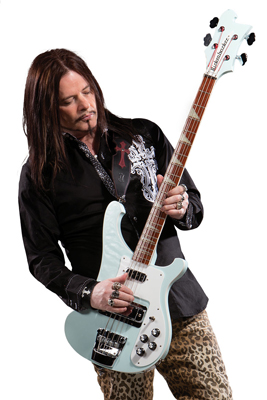 John Payne: The Midwest has always been a great area for prog music, and despite living in California, then living in [Las] Vegas as I do now, I find myself going up to the lakes more often than not: big state fairs, big music halls, events. And Chicago, I’ve probably played that city as much if not more than any city in the United States. For some reason, prog and classic rock is very alive in Chicago. It’s been a long time since I’ve done a show with Three Dog Night, probably ten years ago. We’re really looking forward to touring this year and doing that show with Three Dog Night.
John Payne: The Midwest has always been a great area for prog music, and despite living in California, then living in [Las] Vegas as I do now, I find myself going up to the lakes more often than not: big state fairs, big music halls, events. And Chicago, I’ve probably played that city as much if not more than any city in the United States. For some reason, prog and classic rock is very alive in Chicago. It’s been a long time since I’ve done a show with Three Dog Night, probably ten years ago. We’re really looking forward to touring this year and doing that show with Three Dog Night.
What can RiverEdge Park expect specifically from your set?
Payne: You have to play the card of people want to come and see the hits. It’s all well and good slipping in a new track here and there, but these shows are very much about nostalgia, so we play a lot of the stuff from the first Asia album. We play all the major hits, like “Heat Of The Moment” obviously, “Only Time With Tell,” “Sole Survivor,” “Wildest Dreams,” “Here Comes The Feeling,” “Don’t Cry.” It’s really back to back Asia hits and then a couple of songs from my era as well, like “Who Will Stop The Rain?” But we just celebrated a double anniversary: 40 years of the band and 30 years since I joined the band. I’ve now been doing these songs for [over 30] years as the new boy.
What was it like coming into the band as the 1980s turned into the ‘90s?
Payne: It was an interesting time. The music scene was changing a bit, but late ‘70s and ‘80s sounds are very much what’s influenced me, and then coming into filling some big shoes with John Wetton. He had been in King Crimson, U.K., and filling in after someone so talented was quite daunting, actually, joining the band at first. I’d been working with the ELO Part II and that was taking ages to get together. Then Geoff Downes asked me to join Asia in 1991 and I really haven’t looked back. It’s been a great journey, luckily, and hopefully that journey is still continuing.
What have been your defining moments of your experiences in Asia so far?
Payne: We’ve done some very, very cool shows. One of my favorite shows was just a small show in Barcelona and that was fantastic, just a small place that was probably an 800-seater that they packed about 2,000 people into. We had [drummer] Chris Slade and [guitarist] Guthrie Govan on that tour to big gigs like Joe Robbie Stadium. We shared a dressing room with a bunch of people, Paul Simon, Julio Iglesias, a couple of the Bee Gees, Crosby, Stills & Nash, which was a fun show. That was to 80,000 people and then Estonia. We played for 150,000 people over there and stuff like going into Berlin not long after the Wall had been torn down and playing in some of those places where they hadn’t got to see any classic rock bands. Same in Romania when we went there and we played the football stadium. There’s been some great ups and downs, you know, some real fun times. Mostly, it’s been a very enjoyable ride.
How do you think the group will go down in both the history of progressive rock and pop?
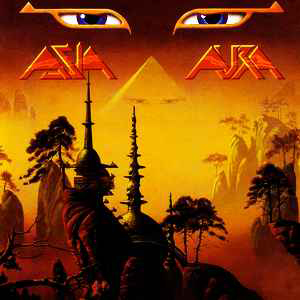 Payne: So that’s a very interesting question and it’s probably got two answers. One’s “very well” and the other ones’ “badly.” A lot of people embraced Asia. When it came out, they didn’t expect it to do so well, the first album. Even though it was an assembled supergroup, which [Geffen record label executives] David Geffen and John Kalodner got involved in putting together, for some people, it was not prog enough, so some people were led sideways by that. They expected to hear more of U.K., Yes and King Crimson influences, but it my mind, it actually drew a commercial songwriter edge to prog. Prog can very much be “music by numbers,” and bands like Genesis, and Yes, always had great hooks and songs. That’s one thing that Asia really did bring to the fold was the songwriting and then the radio friendlessness of some of those songs really helped to catapult the band into selling over ten million albums.
Payne: So that’s a very interesting question and it’s probably got two answers. One’s “very well” and the other ones’ “badly.” A lot of people embraced Asia. When it came out, they didn’t expect it to do so well, the first album. Even though it was an assembled supergroup, which [Geffen record label executives] David Geffen and John Kalodner got involved in putting together, for some people, it was not prog enough, so some people were led sideways by that. They expected to hear more of U.K., Yes and King Crimson influences, but it my mind, it actually drew a commercial songwriter edge to prog. Prog can very much be “music by numbers,” and bands like Genesis, and Yes, always had great hooks and songs. That’s one thing that Asia really did bring to the fold was the songwriting and then the radio friendlessness of some of those songs really helped to catapult the band into selling over ten million albums.
Can you describe working with each of the founding members: Geoff Downes, Steve Howe and Carl Palmer?
Payne: Coming from basically nowhere, I’d done a lot of singing on people’s albums. I had a few bands together with ex-Iron Maiden and Michael Schenker members, and a little stint in the ELO reformation, but these guys were revered as some of the best rock musicians of their day: Steve Howe, Geoff Downes, Carl Palmer. They’re all incredible players in their own right. I would say up until a few years ago where relationships soured, that was really good. I got on great with Steve Howe. I shared a house with Geoff Downes for 16 years. We moved into a recording studio. He had his apartment and I had a cottage. We lived in the woods of Wales, the countryside. Yeah, I got on with them all very well. It was a good little family and I was honored to be even considered a part of such a rich musical, prog heritage.
The original group reunited for awhile, but then John Wetton passed away. Were there ever talks of you getting back together with the others or what might it take for that to happen?
Payne: I don’t know really. There has not really been any murmurings of anything. I think as time goes by, any grievances or whatever between people tend to dilute. I wouldn’t rule it out as an impossibility, but I wouldn’t say it’s a probability. But I think I had a long career with eight studio albums. Geoff and Carl, they are a huge part of that sound and Steve.
There seems to be a little bit of a mystery as to what exactly happened. I know the two groups went their own ways. Are you able to shed light on what went down and where everything stands right now?
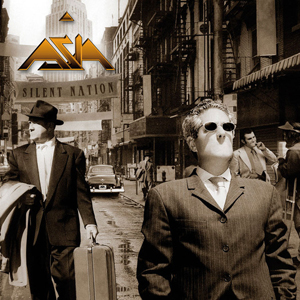 Payne: Yeah, well what had gone down really was, I think when you’ve got all those members of a supergroup originally, and they’re all still alive, working, playing and singing, well, it’s kind of inevitable that something like that happens. And I think Geoff, who I was very close with, was probably very torn, even though we worked together and built our own following, our own, like, Mark II version of the band. The offer was very strong for the original members to all come back together and actually take it up a peg. I think they did that, certainly touring wise. They did the tour with Journey. Unfortunately, John Wetton had just died and he didn’t make that tour, which was a pretty nice tour, but I think Geoff was in a difficult position, even though it made the two of us, at the time, fall out. But it was a rolling stone that was inevitable to actually happen for the original members to get back together, and of course, when you’re a person on the other side of the fence, you feel side swiped from it. But in looking back now on everything, it was just an inevitably to happen, you know?
Payne: Yeah, well what had gone down really was, I think when you’ve got all those members of a supergroup originally, and they’re all still alive, working, playing and singing, well, it’s kind of inevitable that something like that happens. And I think Geoff, who I was very close with, was probably very torn, even though we worked together and built our own following, our own, like, Mark II version of the band. The offer was very strong for the original members to all come back together and actually take it up a peg. I think they did that, certainly touring wise. They did the tour with Journey. Unfortunately, John Wetton had just died and he didn’t make that tour, which was a pretty nice tour, but I think Geoff was in a difficult position, even though it made the two of us, at the time, fall out. But it was a rolling stone that was inevitable to actually happen for the original members to get back together, and of course, when you’re a person on the other side of the fence, you feel side swiped from it. But in looking back now on everything, it was just an inevitably to happen, you know?
I think people wondered if you were going to be at those Journey shows, but it sounds like that didn’t work out.
Payne: No, that didn’t work out and I have bumped into Geoff a couple of times in the last ten years. But I don’t even know now that Steve would want to come back to Asia. I’m not sure. I think Asia really now, actually, are much driven by Geoff and Carl, but as I said, as time has gone by, doors will be opened. Otherwise, I’m happy carrying on now singing such really great songs.
You certainly had success with the group, especially with the “Aqua” album, but some of the later projects were overlooked, despite possessing very strong material. Tell us about coming into the fold on such a high and why others didn’t latch on.
Payne: “Aqua” did very well in Europe, particularly in Germany. We did sell quite a few albums in the United States. “Who Will Stop The Rain?” was in pretty heavy rotation on the radio, which was great for us and great for touring. But as time goes on, even though some of the albums were our strongest, is that [the trends were] walking away from that sound of music. But that’s the sound of music I like doing. I’m not going to change what we’re doing, but times really changed a lot for us. More and more, physical CDs [became less popular]. What car has a CD player in it? Now we’ve gone down to streaming. The classic bands, maybe if they put some vinyl out with good artwork, it’s stable product. The days of the ‘80s rock financial paradigm have gone, but that’s not to say [the music isn’t still strong]. I listen to a thing called ProgRadio.com a lot. There’s lots of great music out there, some really good stuff.
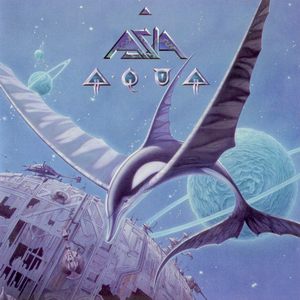 Did you ever meet John Wetton or hear of any thoughts he had on you stepping up to the microphone in Asia?
Did you ever meet John Wetton or hear of any thoughts he had on you stepping up to the microphone in Asia?
Payne: I met John Wetton at the Russian Embassy. They did an album called “Rock Aid Armenia,” which was basically to get some money for the earthquake [victims]. It was very brief. I was friends with Geoff. I had just started working with him, and then the last time anything like that came to mind was a friend of mine, a journalist called Dave Ling, who writes for “Classic Rock” magazine and is a big journalist in the U.K., called me up and said, “I’m going to print this. John Wetton said that he doesn’t like you and he thinks you’re a crap singer. Have you got any comments?” (Laughs) And I said, “Not really, I think he’s a great singer. I love all the music he’s done. If it wasn’t for him, I wouldn’t be in Asia.” So we didn’t really have any interaction at all and that’s very much why when John was in the band, I was definitely not to be spoken of.
If I’m not mistaken, he walked away from the group and you carried it on until he returned.
Payne: He did walk away, yes, so I had the opportunity to carry it on, and at the time, I didn’t think he was that vocal about it. He definitely had his run in with Geffen as well and then he had his run in with the band when they replaced him for a short while in Japan with Greg Lake to do the [MTV broadcast] “Asia In Asia.”
In any case, it’s been about a decade since Asia featuring John Payne released “Recollections: A Tribute To British Prog.” How did you feel that was received and are there any more recordings in the group’s future? If so, what might they sound like?
Payne: I think that had mixed reception. I loved doing “Eye In The Sky” and I got Alan [Parsons] to come and be in the music video. At the time, I was doing a show in Vegas, so I didn’t want to do a new studio album I would tour because I wasn’t available. I had a show called “Raiding The Rock Vault” that was five dates a week, so instead of doing a proper studio album, it’s just a little interlude of songs that really helped form progressive and classic rock. So, they are some of my favorite songs by ELP, and U.K., and The Moody Blues, and for a lot of people, they thought, “Well, this is not really an Asia album as such,” but it was just supposed to be a joining point to where I am now where I have the freedom now to do a new Asia album, which I’m working on at the moment.
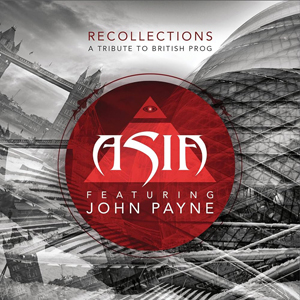 It’s very much going back to the first album, to prog roots, some influences of Genesis and Yes, some long songs. One is called “Message In The Sand.” It’s about ten minutes long and we’ve had Rodney Matthews do the album cover. Like old Asia, it starts with an “a” and ends with an “a.” It’s going to be called “Aviana,” which means “bird-like.”
It’s very much going back to the first album, to prog roots, some influences of Genesis and Yes, some long songs. One is called “Message In The Sand.” It’s about ten minutes long and we’ve had Rodney Matthews do the album cover. Like old Asia, it starts with an “a” and ends with an “a.” It’s going to be called “Aviana,” which means “bird-like.”
I think we’re going to go for just vinyl initially on this and then on to the steaming platforms, but [we] definitely don’t have an actual date because it’s a very important album for us. I want it to be finished, rather than sometimes you go for a date and you’ve got all the machine’s working, and you can’t change that date, and then you can possibly have musical integrity compromised if you’re rushing something. Us musicians are terrible. Nothing’s ever finished. Even when you mix the sound, you go, “Can I get one more please, sir?”
You’re also leading Dukes Of The Orient and have thus far released two albums. Can you trace the progression from the self-titled debut to the latest, “Freakshow”?
Payne: So those two albums were with my ex-Asia keyboard player, Erik Norlander, who’s very well known in the prog world and we’re great friends. Those two Dukes albums came out on Frontiers Records, which is a big record company out of Italy, and really they are a little bit more progressive than my other stuff. I was in a band called GPS, which was more highly progressive as well, so I think that it’s been a nice side project. I would imagine we will do another album. I think we’re at the stage with that band where we could do some shows, but there is not the market for this band at this point in time.
You mentioned Erik being in Asia. The supergroup trend of having top-notch musicians continued even as the personnel changed. Who are a few notables that stand out to you?
Payne: I mean three of the best drummers in the world: Vinnie Colaiuta, who was [with] Frank Zappa and Sting, Simon Phillips, who just about played with everybody from The Who to Toto, and Chris Slade, who was in AC/DC and Manfred Mann’s Earth Band. Of course, we’ve had people like [King Crimson/Peter Gabriel bassist] Tony Levin guest on it, Pat Thrall [Pat Travers Band, Meat Loaf] on guitar, Elliott Randall on guitar from Steely Dan, Guthrie Govan, who’s now doing great with his band The Aristocrats. Some very, very cool players I’ve been lucky to work with, just these top guys. It’s been incredible.
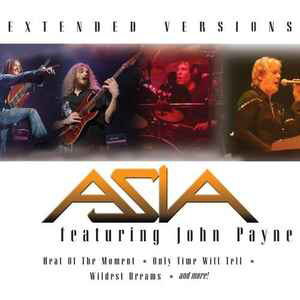 Why do you think Asia attracted so many A-list musicians over the years?
Why do you think Asia attracted so many A-list musicians over the years?
Payne: I think because of it being musical and challenging a bit, but also it’s very song driven and that’s always been an important thing for me, the hooks and the choruses.
What are some of the other projects you have cooking right now with other artists?
Payne: “The 80’s Rock” Tour, where Asia does an hour set and then we bring on a great line-up of people where we’ve had Lou Gramm, Steve Augeri [Journey], John Elefante [Kansas], Steve Walsh [Kansas], Robin Zander [Cheap Trick], Kelly Keagy [Night Ranger], to name a few of them, and it’s great for me to play these incredible songs of my life. Getting on stage with Lou and playing “I Want To Know What Love Is” or playing “The Flame” by Cheap Trick, it’s the ultimate covers experience.
Can you think of anything else as you turn the GPS towards Illinois?
Payne: We are looking forward to coming up to Chicago and playing with Three Dog Night on that show. It will be a really cool event I think. I just want people to come, remember their childhoods or what was happening to them at that time. It’s a trip down memory lane for other people. A lot of people bring their kids and its the first time they see Asia. I really enjoy still being able to do that.
Asia featuring John Payne opens for Three Dog night at RiverEdge Park on Friday, June 21. For additional details, visit AsiafeaturingJohnPayne.com and ParamountAurora.com/RiverEdge.

